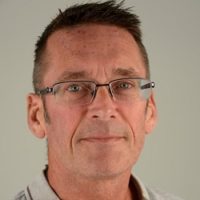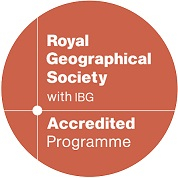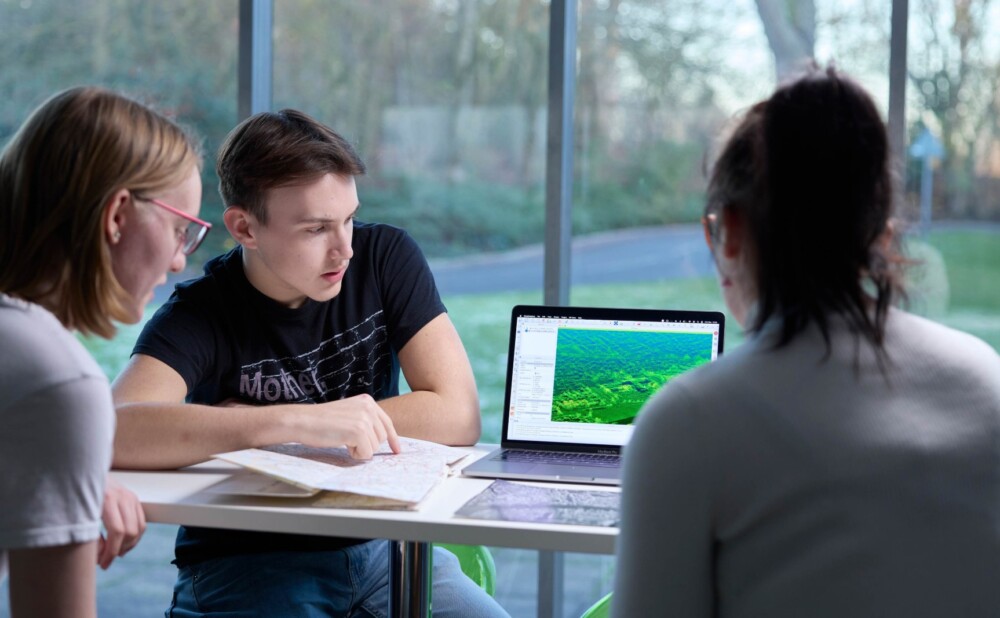
Greg Spellman
Senior Lecturer in Geography
Faculty of Arts, Science and Technology
DiscoverGet in touch with us as we may be able to offer you a place for September 2024 through Clearing.
UCAS Code
BSc: F800
BSc with Foundation: F801
Level
UndergraduateUG
BSc (Hons)Duration
Full Time: 3 years
Full Time Foundation: 4 years
Part Time: 4 years
Starting
September
BCC at A-Level or,
DMM at BTEC
Fees UK 24/25
Full Time: £9,250
Part Time: £1,540 (per 20 credits)
Integrated Foundation Year: £9,250
Fees International 24/25
Full Time: £15,200
Integrated Foundation Year: £15,200
Location
For questions regarding study and admissions please contact us:
study@northampton.ac.uk
0300 303 2772
What physical and human factors impact on our environment? How are they being addressed at local, national and international levels? How can we influence change?
Our BSc Geography degree at UON uses small group teaching and one-to-one tutorials to ensure you get individual support from our team of enthusiastic, experienced and research-active academic staff. There is flexibility in the programme, enabling you to specialise in the types of geography that interest you as well as opportunities to attend field trips throughout the degree.
Your learning is assessed through a variety of coursework tasks, designed to help you develop skills to support employability and you will learn how to use industry-standard Geographical Information Systems (GIS). We maintain strong links with employers, and our dedicated career planning module includes a short work placement in your final year to give you practical experience.
Top 10 for Student Satisfaction
Geography is top 10 for student satisfaction in the Complete University Guide Subject League Table 2025.
Top 20 for Geography
The University of Northampton is a top 20 institution for Geography in the Best UK University Guardian League table for 2024 and top 20 for Graduate Prospects in the Complete University Guide Subject League Table 2025.
This geography degree has been accredited by the Royal Geographical Society (with IBG). Accredited degree programmes contain a solid academic foundation in geographical knowledge and skills, and prepare graduates to address the needs of the world beyond higher education. The accreditation criteria require evidence that graduates from accredited programmes meet defined sets of learning outcomes, including subject knowledge, technical ability and transferable skills.

Updated 03/07/2024
The BSc Geography degree at the University of Northampton has been designed to contribute towards achieving the following United Nations Sustainable Development Goals: SDG7: Affordable and Clean Energy and SDG13: Climate Action, SDG11: Sustainable Cities and Communities and SDG15: Life on Land.
Our Geography BSc degree includes a mix of human geography and physical geography modules. Topics may include climate change, sustainable development, social and economic inequalities, migration, weather, water resource management or, geographies of sport. There is a choice of modules at Stages 2 and 3, with flexibility to enable you to specialise in human geography or physical geography if you wish to.
Classes, which are supported by online resources, are interactive and include activities and discussion.
Modules are assessed through coursework and a small number of in-class tests. Coursework assignments are varied – there are written assessments (such as reports and essays), research-based and data-analysis tasks, and some verbal assignments (such as group presentations or debates). There are no formal examinations.
During Stage 1 you will cover six compulsory modules, ensuring you have a solid foundation in key aspects of the subject. These modules cover both human geography and physical geography, as well as exploring key issues such as sustainable development and global inequalities. There are local fieldwork activities too, enabling you to put your learning into practice.
There are three compulsory modules at Stage 2. These develop your field skills in both human geography and physical geography, provide insights into contemporary issues within the Global North (such as social inequalities and changing urban spaces), and introduce you to the theory and use of Geographic Information Systems (GIS) for storing, manipulating, analysing and visualising data. In addition, you choose three designated modules giving you the opportunity to focus your studies more on human geography or physical geography or keep a balance between the two.
Employability skills are integrated throughout the degree. A series of career planning workshops at Stage 2 will help you to explore the diverse range of roles available to Geography graduates and provide you with opportunities for networking with professionals in the field.
At Stage 3 you will choose three designated modules, developing advanced knowledge and understanding of particular topics as well as undertaking research on a geographical topic of personal interest in the Dissertation.
The compulsory Career Planning and Employability module includes individual careers support, talks from employers, and a mock job application and interview exercise. There is also a 30-hour work experience placement where previous students have been involved with local planning and surveying companies, environmental consultancies, schools and sustainability teams. We will support you in finding a placement that aligns with your own interests.
Geographic Information Systems (GIS) skills are valued by employers, so we ensure you have access to industry-standard software. You will be introduced to GIS at Stage 1, develop your confidence in using it at Stage 2, and can then enhance your skills at Stage 3. You will also have access to industry-standard equipment for 3D imaging and topographic surveying.
There are opportunities to do local fieldwork at all stages of the degree. During Stage 2 there is a residential fieldcourse in the UK, the costs of which are covered in your course fees. Previous destinations have included London and the south-east, the Jurassic coast, and Devon. An optional international study trip may be available, for which there would be an additional cost.
We want you to feel supported throughout your studies and you will have regular meetings with your Personal Tutor. A Personal Tutor is a member of the teaching team who will help you to develop your academic skills and guide you to relevant support services. You will also be able to meet individually with lecturers to ask any questions you have about classes or assignments.
Please note the modules shown here relate to the academic year 24/25. The modules relating to the academic year 25/26 will be available from June 2025.
A typical offer to study BSc Geography at the University of Northampton would be:
We welcome international applicants and applications from students with a range of non-traditional educational or professional qualifications.
We welcome applications from students with a mix of A levels and BTEC/Cambridge Technical qualifications.
For more information on how to make an application, please visit our How to Apply page.
If you are an International student and would like information on making an application, please see our How to Apply page.
Admission to this geography degree foundation programme is normally:
However, we would also like to hear from you if you have professional or industry experience instead, a range of other qualifications or self-developed subject knowledge that relates to the programme you wish to study.
All International and EU students applying for a course with us must meet the following minimum English language requirements:
For information regarding English language requirements at the University, please see our IELTS page.
Fees quoted relate to study in the Academic Year 23/24 only and may be subject to inflationary increases in future years.
Our Geography degree includes residential and day fieldwork trips within the UK. These opportunities help you to develop your skills and also visit sites that may be restricted for the general public.
As well as local area visits, there may be opportunities for overseas fieldwork.
There is no charge for compulsory field visits within the UK, however the optional overseas trip would incur an additional to be confirmed by your tutor.
Fees quoted relate to study in the Academic Year 23/24 only and may be subject to inflationary increases in future years.
Our Geography degree includes residential and day fieldwork trips within the UK. These opportunities help you to develop your skills and also visit sites that may be restricted for the general public.
As well as local area visits, there may be opportunities for overseas fieldwork.
There is no charge for compulsory field visits within the UK, however the optional overseas trip would incur an additional to be confirmed by your tutor.
For information on the scholarships available to you, please see our scholarships page.
For more information about possible funding options, please visit our Fees and Funding pages.
At the University of Northampton, everything we do, from funded trips to paid internships, is to give you everything you need to make a difference when you leave.
If you join this full-time BSc Geography degree at Northampton, you will receive a laptop when your course begins*. The laptops are built to a bespoke custom specification ideal for use in the seminar room, collaborative group work or studying at home.
Whatever your ambitions, we’re here to help you to achieve them. We’ll support you to identify the skills you’re learning during your geography degree, find your strengths and secure practical experience so that when it comes to applying for jobs or further study you’ll feel confident in standing out from the crowd. We’ve created the Northampton Employment Promise because we are so confident that if you focus on your studies and complete one of our awards you’ll be highly employable by the time you graduate. Putting you in a great position to secure employment or continue your studies.
To check out the full list of perks, visit our Student Perks page or dedicated International Perks page.
*UK fee payers only (see Terms and Conditions for further details).
The Integrated Foundation Year (IFY) offers a new and exciting route into studying for a degree, attracting ambitious and driven students who are willing to learn and advance.
If you have non-standard qualifications or do not quite meet the admissions requirements for BSc Geography we can offer you a fantastic opportunity to study a four year programme which includes an Integrated Foundation Year. The Integrated Foundation Year will help you develop the theoretical/practical and academic skills you need, in order to successfully progress to the full award.
Featuring a reduced tuition fee in the first year, our four-year courses will enable you to successfully follow the degree pathway of your choice while gaining essential study skills. The foundation year of your chosen degree will be studied on a full-time basis and is aimed at supporting the transition to higher education. Years two, three and four are then studied as a standard degree programme.
The Geography department take part in GeoNight, with an activity about geography, sport and climate change; this features issues and case studies studied in our ‘Geographies of Sport’ final year undergraduate module.
Face-to-face sessions are organised as interactive classes with discussion and activities. For some modules on BSc Geography, there are workshops in the laboratory or computer room. Classes are supported by online and technology-enhanced learning to ensure you have the best possible study experience to achieve your potential.
You will typically have 12 hours contact time per week, in addition to 20-25 hours per week of independent study. You are encouraged to meet with staff on a one-to-one basis to get additional study support, and also receive timetabled personal tutor meetings each term.
Each module generally has two items of assessment. Assignments are designed to develop your skills, as well as test your knowledge and understanding. There is a range of written assignments, including reports and essays. You may also be asked to analyse data or reflect on your learning.
In some written assignments you will be tasked with writing in a style appropriate to a particular audience. Presentations, debates and discussions are used to assess your verbal communication skills. There are no formal examinations, but there are a small number of class-based tests. A detailed set of instructions is provided for every assignment. You are encouraged to meet with academic staff to get one-to-one support.
Fieldwork is key to understanding geographical issues and developing transferable skills. Many of our modules include part- or full-day field trips. Typical locations include London and the Midlands. In addition, we often conduct fieldwork on and around campus. There is a UK residential trip at Stage 2, the cost of which is included in your fees. There may be optional overseas trips and locations in previous years have included Barcelona, Las Vegas and the Grand Canyon. We fund travel and accommodation costs on compulsory study trips. There are additional fees for optional trips.
Senior Lecturer in Geography
Faculty of Arts, Science and Technology
DiscoverSenior Lecturer in Geography
Faculty of Arts, Science and Technology
DiscoverSenior Lecturer in Geography
Faculty of Arts, Science and Technology
DiscoverSenior Lecturer in Waste Management
Faculty of Arts, Science and Technology
DiscoverSenior Lecturer in Geography
Faculty of Arts, Science and Technology
DiscoverSenior Lecturer in Environmental Science
Faculty of Arts, Science and Technology
DiscoverCareer planning workshops take place in all years of study. In addition, there is a career planning module, which focuses on developing your awareness of jobs you can do with a Geography degree, recruitment processes, and your own subject-specific and transferable skills. The module also includes a short work placement. We work closely with careers advisers to ensure students get one-to-one career guidance and support.
You will have opportunities to network with employers and our own graduates through events on campus, online, and through our dedicated social networking site. This provides you with insights into the wide range of careers university Geography graduates enter.
Our geography degree graduates gain employment in a wide range of sectors such as planning, environment, transport, education, energy, insurance, and local government.
Examples of the roles secured by recent graduates include: Flood and Coastal Risk Management Officer; Sustainability Projects Officer; Graduate Transport Planner; Net-Zero Data Analyst; Geography Teacher; Graduate Planning Officer; Trainee Land Surveyor; Graduate Geo-Environmental Engineer; Graduate Project Officer; GIS Technician; Researcher.
"It’s definitely helped to prepare me for the real world, including with interviews and professional careers." - Ahmad-
You will have access to a range of modern and well-equipped IT laboratories across the Waterside campus. As part of your studies you will also get an ESRI ArcGIS software license to use at home. This will help you develop highly desirable digital skills using an industry-standard Geographic Information System (GIS) for mapping and spatial analysis. As part of your studies, we will also provide you with access to historical and contemporary Ordnance Survey mapping data via the Edina Digimap service.
You will learn to use a wide range of field survey equipment throughout your geography degree, mapping changes to our dynamic environment. We will provide you opportunities to use specialist equipment that you may use in your future career. This includes survey-grade Global Navigation Satellite Systems (GNSS) for precision topographic surveying and a Terrestrial Laser Scanner (TLS) for 3D imaging.
You will have access to our Geographical and Environmental Sciences laboratory, allowing you to work on projects alongside our team of active internationally-recognised researchers. Our laboratories are well equipped and include a laser granulometer and gamma-ray spectrometer that you can use for environmental surveys and assessments.







